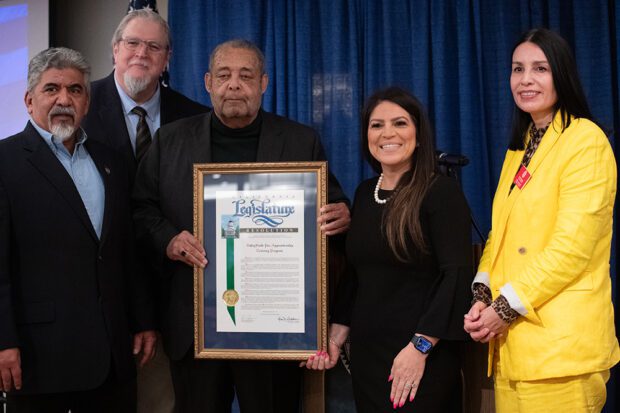
With 15 years of success under its tool belt, the ValleyBuild construction trades program is becoming more essential than ever. It recruits and provides training for an inroad to good-paying skilled jobs in the building industry for people in 14 San Joaquin Valley counties.
It is a collaboration of the local building trades council and workforce development board to enhance opportunities for Valley residents to have high-level skilled work with benefits for a lifetime. Blake Konczal, a ValleyBuild founder, is executive director of the Fresno Regional Workforce Development Board, which is funded through federal and state grants.
“There is a lack of good paying jobs in the Valley, so the opportunities afforded by acceptance as a union apprentice in the construction trades are huge,” says Konczal.
“ValleyBuild is an apprenticeship readiness program, and it prepares people to be in a competitive position to become an apprentice.
“I think one of the strong points of how we operate the program is that we have actual people from the trades doing the pre-apprentice class. It gives the trainees an opportunity to see clearly what the real world of being a union construction apprentice is like.”
Once upon a time it was generally thought that a college degree was the surefire pathway for a rewarding and well-compensated career. That was true up to a point. People coming of age in the 1950s and 1960s had the fortunate opportunity of an inexpensive education and a growing technology and knowledge economy.
Attending any esteemed University of California campus in the mid-1960s cost $240 per year for tuition, which included full medical coverage and tickets to all the sporting events.
Compare that with today’s fee of $15,000 and up for in-state students. Housing costs have risen dramatically as well. And in today’s economy, those guaranteed careers are also uncertain for graduates in many fields of study. Enter automation and artificial intelligence to impact the knowledge economy even more.
Samuel Norman of the Rios Company also helped organize ValleyBuild. He emphasized that they recruit people who need skilled jobs and whose lives would be changed by the program. “We actually put an emphasis and a focus on those individuals who are hard to serve or looking for a second chance.
“Part of the outreach would be toward community-based organizations that we could tap into. As we evolved, we also realized that there was a big gap for the rural communities, because the training was Fresno-centric.”
Norman also highlighted recent action ValleyBuild is taking to break the glass ceiling. “We did a presentation to the Salvation Army. They have a program for both men and women.
“I was really taken with how disciplined the whole group was. It was about a hundred individuals, maybe a quarter of them were women. And it was well received. In fact, we now have an all-female class. We are in the business of creating careers.”
On the actual building side of the equation, Chuck Riojas, another ValleyBuild founder, heads the local Building Trades Council and does outreach to all the construction trade affiliates such as plumbers, electricians, operating engineers and masons.
“Basically, we just introduce them to the trades,” says Riojas. “It’s almost like an expanded career day. We get six to seven affiliates that participate.
“The participants will spend two days at the electrical training center, two days at the plumbing, two days with the operators, one or two days with sheet metal. They walk away with certifications that make them more employable once they leave our program.
“By the time we get them in the classroom, there is a good chance not only that they will finish the program but a decent chance that they can get access to apprenticeship and success.”
Norman says that personal skills are equally important. “The trainees actually get an opportunity to see if they have some of the soft skills that are necessary to be a good employee. Do you come to class on time? Do you do the homework? How do you function with other individuals?”
Riojas is proud of the diversity that the building trades are embracing. “You know, we had a country club mentality. But in the last 20, 30 years, I’m happy to say that those doors are now open to a lot of people, to a diverse community. Everybody’s welcome as long as they have the aptitude and the ability to get it done.”
Skill classes in high schools like wood and metal shops are a relic of the past. There is now a growing recognition of their value in general and in providing job skills. Riojas would like to bring that back.
“How do we take this program and at least start with the juniors in high school and introduce them to the trades and introduce them to some skills since all kids we know are not going to college now because the expense is too great,” notes Riojas. “So, this is a way for them to get a career without having student debt.”
Local organizations also benefit from ValleyBuild, Norman says, through the community projects that trainees work on. “We invite community organizations to give us a recommendation on projects that they have. They need something done. It gets the trainees working right away.
“And a lot of the individuals by the end of this project go into apprenticeship or into another job. Over the 15 years, we’ve had like a 92% completion rate for the individuals who take the class and close to an 80% placement rate for individuals going into employment after the class.”
Riojas points out that ValleyBuild follows up with the trainees afterward. “The workforce board has responsibility for them for another year for job placement, and so they go out and monitor them and their employment status and where they are going. We try not to lose anybody in the gaps.”
Konczal underscores the importance of the program to the Valley. “They’re career positions with good wages, healthcare benefits and dignity. We do not in the Valley have the same variety or depth of industry sectors that occur in other parts of the state. So, our residents do not have the same opportunities.
“This program offers working-class individuals an opportunity for real success. And by real, I mean things that we could gauge empirically.
“A wage is an empirical data point. Benefits are something tangible. Retirement is something tangible. Having rights when you are on the job site is something tangible.
“If these jobs are not filled by apprentices who are local residents, workers will be imported from out of the area to take these jobs.”
How lucrative are these careers? Very much so, says Riojas. “First day in the trades, from $22 to $27 an hour. Most of them will start a pension after a probationary period. Most of them will be offered six month or yearly raises throughout their apprenticeship.
“I’m an electrician by trade, and right now a journeyman after five years of apprenticeship is at $49 an hour plus pension, plus healthcare. And so the total package is roughly $75 an hour for a journeyman wireman. And most trades are within three to five dollars of that.”
There is also the satisfaction that construction work brings to the individual, Riojas adds. The pride that comes from the public works built by their labor, like schools, bridges, roads, government offices and the multitude of structures throughout our urban landscape. “My family doesn’t even drive through Fresno with me anymore because I’m always pointing out things that I’ve built or had a hand in.”
According to Konczal, even climate change is providing the opportunity for a new ValleyBuild project, the Greater Sierra Forestry Corps. “The problem of dead and dying trees in the Southern Sierras is massive. And there’s an insufficient supply of qualified workers.
“So, we are training forest fuel management, removing dead and dying trees before they become fuel for a fire. We have had an almost 100% placement rate over the last five years because there is such a demand for these jobs.”
Success stories are abundant for ValleyBuild graduates. A look at their website will verify that. Daniel Iosefa proved it. He had worked a variety of jobs as he took care of family needs, but was not on a career path.
“I would recommend it to anyone who does know what they want to do, but doesn’t know what road to take. If they have a passion for construction, this pre-apprenticeship program is the way to go.” Iosefa is now an apprentice electrician.
Nidia Chicas was working three jobs to support her struggling family. Then last year she enrolled in the Multi-Core Craft curriculum along with other women in the second all-women cohort at ValleyBuild. Now she is an apprentice taper of the finishing trades and in Painters Local 294.
“It’s changed the lives of me and my kids,” says Chicas. “I feel less stress; I feel no stress at all. I don’t have to worry about how I’m going to pay rent, I don’t have to worry if I’m going to be able to make my car payment. It’s a big change.”
There are many more stories of success, proving how vital ValleyBuild is to the economic and personal future of Valley people in the years to come.

